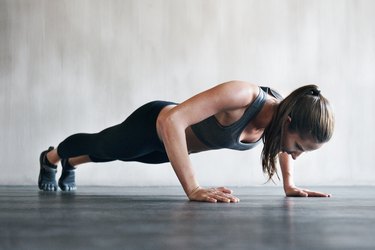
Biceps are the muscles on the front of your upper arm — they are considered the "show" muscles. If asked to flex your muscles, you are likely to intuitively flex your biceps. No standards exist in the fitness world for how big your biceps should be. Having "big" biceps is relative to your body frame size and overall musculature.
Tip
Whether you consider your biceps to be big or not is dependent on the size of the rest of your body and your overall musculature.
Video of the Day
The World Record
Isaac Nesser holds the record for the world's largest arms. In a relaxed state, his upper arms measure 29 inches. The official basketball of the National Basketball Association is 29.5 inches in circumference. Nesser has a large frame to match his biceps. He is 6 feet tall and weighs more than 350 pounds. He uses up to 315 pounds for the barbell curl exercise.
Video of the Day
Read more: Biceps Workouts With a Pull-Up Bar
Find Your Ideal Size
For you to have big biceps, you don't need to match the size of Nesser's arms. If your biceps are easily visible when you aren't flexing, you already have big biceps. Proportion and symmetry are more important than pure size, especially for bodybuilders. Your arm size should match the rest of your body frame.
The idea of the perfect physique is subjective, but bodybuilders often use the measurements of classic physiques, such as those of the Greek and Roman statues, to create a sense of proper symmetry. According to the proportions of these statues, your bicep should be a little more than twice the size of your wrist. Another well-respected physique is that of Steve Reeves, a professional bodybuilder in the 1950s. While there's no official biceps size chart, according to Reeves' proportions, your biceps should be 252 percent larger than your wrist.
Build Your Guns
To get big biceps, you need to train not only your biceps, but also your entire body. Lifters with huge biceps don't have flat chests and small backs. Back exercises work your biceps and chest exercises work your triceps. Focus on compound, multi-joint exercises, such as squats, presses and rows. Start your biceps workouts with rows, pulldowns and pullups. Finish off with biceps isolation exercises, such as dumbbell curls, cable curls and preacher curls.
Read more: Biceps Lat Pulldown Exercises
Measure Your Arms
To measure your biceps, relax your arm down at your side and wrap a tape measure around the middle of your upper arm, at the halfway point between your shoulder and elbow. Avoid measuring immediately after exercise, which can give you a larger reading from temporarily increased blood flow. Keep a diary of your measurements to track your progress.
Although called a biceps measurement, you actually measure your upper arm, which includes your triceps — the muscles on the back of your arm. You cannot measure your biceps in isolation. If you want large upper arms, work your triceps muscles, which comprise the majority of your upper arm.